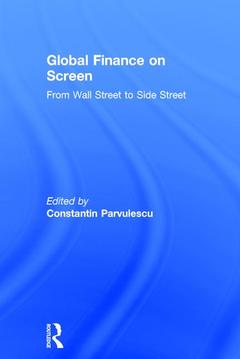Description
Global Finance on Screen
From Wall Street to Side Street
Author: Parvulescu Constantin
Language: English
Subjects for Global Finance on Screen:
Keywords
Margin Call; Big Short; Oliver Stone’s Wall Street; oliver; Young Man; stones; Main Character; Graham Murdock; Wall Street Films; Robert Burgoyne; Federal Reserve; Pablo Echart; Stratton Oakmont; Pablo Castrillo; Company’s Ceo; Jens Maesse; Gordon Gekko; Karen Ho; Trading Floor; Scott Loren; Wall Street; Ignacio Ferrero; Stone’s Wall Street Films; Marta Rocchi; Stock Ticker; Robert E; McNulty; Boiler Room; Daniel Marcus; Finance Film; Elena Oliete-Aldea; Online MBA Program; Araceli Rodríguez Mateos; Hot Chicks; Michael Chanan; Bank Ceo; Federal Reserve System; Dominant Finance; Conjunctural Analysis; Inside Job; Representational Economies; Deregulation Era
Publication date: 12-2017
· 15.6x23.4 cm · Hardback
Publication date: 12-2017
· 15.6x23.4 cm · Paperback
Description
/li>Contents
/li>Readership
/li>Biography
/li>
Global Finance on Screen is the first collection exclusively dedicated to a growing body of multi-format and multimedia audiovisual work that this book designates as the finance film. Finance film provides critical visualizations of the secretive, elitist, PR firewalled, and gender and race-biased world of finance, and its mysterious characters, jargon and products. It reconstructs for the screen and for broader audiences finance?s logics, responsibilities, practices, and ethos, and traces the effects of money, markets, investment, credit, debt, bubbles, and crashes on our well-being, desires, values, and actions.
The chapters for this interdisciplinary collection are written by European and North American scholars in film studies, anthropology, business ethics, cultural studies, political economy, and sociology. They reveal and evaluate the ability of film to document financial cultures; reflect economic, cultural and political transformations related to financialization; indicate the alienating and exploitative consequences of the growing role played by financial services in the global economy; mobilize social action against finance?s excesses; as well as spread finance and capitalist mythology. The collection offers in-depth investigations of feature films such as Wall Street, Freefall, Margin Call, Justice&Co, The Wolf of Wall Street,and The Big Short, and documentaries such as Inside Job, Capitalism: A Love Story and In a Strange Land.
List of Figures List of Tables List of Boxes Introduction, Constantin Parvulescu Section 1: Telling Finance Stories Chapter 1: Graham Murdock, Narrating Finance Capital: Explorations in Speculation, Crisis and Austerity Chapter 2: Robert Burgoyne, Forms of Time and the Chronotope in the Wall Street Film Chapter 3: Pablo Echart and Pablo Castrillo, Financial Darwinism in Recent American Feature Films Chapter 4: Jens Maesse, "Financial Wisdom" as Discursive Position: How Financial Expertise Is Constructed in Documentary Film Section 2: Critical Interventions Chapter 5: Karen Ho, Finance, Crisis, and Hollywood: Critique and Recuperation of Wall Street in Films about the Great RecessionChapter 6: Constantin Parvulescu, Boiler Room and the Financialization of the American Economy Chapter 7: Scott Loren, Mediating the Crisis: Revisionary Economics in Oliver Stone’s Wall Street Films Chapter 8: Ignacio Ferrero, Marta Rocchi and Robert E. McNulty, No Ethics, No Heroes: How Immorality Flattens Wall Street Characters Section 3: Screening Crisis and Recessions Chapter 9: Daniel Marcus, Documentary Treatments and Cultural Hierarchies: The 2008 Financial Crash in American Documentaries Chapter 10: Elena Oliete-Aldea, Global Financial Crisis in Local Filmic Scenarios: Transnational Cinema of the Great Recession Chapter 11: Araceli Rodríguez Mateos, Precarity and Vulnerability: Documentaries on the Crisis in Spain PostScript: Notes of a Filmmaker Michael Chanan, How to Make a Film about Money and Debt without Any Money and without Falling into Debt AcknowledgementsList of Contributors
Constantin Parvulescu is research fellow at the Institute for Culture and Society, University of Navarra, Spain and guest lecturer at the University of St Gallen, Switzerland. He is author of Orphans of the East: Postwar Eastern European Cinema and the Revolutionary Subject (2015) and the co-editor of A Companion to the Historical Film (2013).




